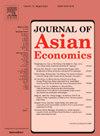How artificial intelligence affects international industrial transfer — Evidence from industrial robot application
IF 2.9
3区 经济学
Q1 ECONOMICS
引用次数: 0
Abstract
The development of high technology represented by artificial intelligence is an essential driver of international industrial transfer. Using country-industry-level industrial robot data and value-added trade data from 2002 to 2018, this paper empirically examines the impact and mechanism of artificial intelligence on the international industrial transfer undertaken by a country (region). The study shows that the application of artificial intelligence can significantly enhance the international industrial transfer undertaken by a country (region). Further analysis shows that artificial intelligence positively affects international industry transfer through two channels: Improving the quality of labor force and promoting the level technological innovation. Further heterogeneity analysis shows that, first, from the economic development degree perspective, artificial intelligence's role in promoting developing economies is more substantial than that in developed economies. Second, the financial crisis has weakened the impact of artificial intelligence on international industrial transfer from the perspective of time division,especially in developing economies. Third, from the perspective of industry heterogeneity, artificial intelligence has significantly promoted the transfer of medium-low and medium-high technology industries. The research in this paper extends the analysis of the effect of artificial intelligence. It provides realistic insights for optimizing the strategic layout of the robotics industry, achieving industrial structure upgrading, optimizing resource allocation efficiency, and grasping the opportunities of global industrial chain restructuring.
人工智能如何影响国际产业转移--来自工业机器人应用的证据
以人工智能为代表的高新技术的发展是国际产业转移的重要驱动力。本文利用2002-2018年国家-产业层面的工业机器人数据和贸易增加值数据,实证检验了人工智能对一国(地区)承接国际产业转移的影响和作用机制。研究表明,人工智能的应用能够显著提升一国(地区)承接国际产业转移的水平。进一步分析表明,人工智能通过两个渠道对国际产业转移产生积极影响:提高劳动力素质和促进技术创新水平。进一步的异质性分析表明:第一,从经济发展程度来看,人工智能对发展中经济体的促进作用要大于发达经济体。第二,从时间分工角度看,金融危机削弱了人工智能对国际产业转移的影响,尤其是对发展中经济体的影响。第三,从产业异质性来看,人工智能显著促进了中低端和中高端技术产业的转移。本文的研究扩展了对人工智能效应的分析。为优化机器人产业战略布局、实现产业结构升级、优化资源配置效率、把握全球产业链重构机遇提供了现实启示。
本文章由计算机程序翻译,如有差异,请以英文原文为准。
求助全文
约1分钟内获得全文
求助全文
来源期刊

Journal of Asian Economics
ECONOMICS-
CiteScore
4.70
自引率
9.40%
发文量
90
期刊介绍:
The Journal of Asian Economics provides a forum for publication of increasingly growing research in Asian economic studies and a unique forum for continental Asian economic studies with focus on (i) special studies in adaptive innovation paradigms in Asian economic regimes, (ii) studies relative to unique dimensions of Asian economic development paradigm, as they are investigated by researchers, (iii) comparative studies of development paradigms in other developing continents, Latin America and Africa, (iv) the emerging new pattern of comparative advantages between Asian countries and the United States and North America.
 求助内容:
求助内容: 应助结果提醒方式:
应助结果提醒方式:


